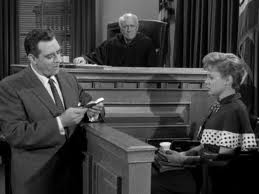Lafler revisited
 You just can't please some people. Michael Marsh is one of those people. Marsh was charged with what's known in the
trade as "aggravated shoplifting": after
helping himself to some merchandise at Walmart, Marsh was accosted outside by
an employee, whose discomfiture at making a dollar more than minimum wage was possibly
assuaged by Walmart's giving him the lofty title of "asset protection
associate." Marsh did not go quietly
into that good night, and the resultant scratch on the associate's hand earned
Marsh an indictment for second degree felony robbery.
You just can't please some people. Michael Marsh is one of those people. Marsh was charged with what's known in the
trade as "aggravated shoplifting": after
helping himself to some merchandise at Walmart, Marsh was accosted outside by
an employee, whose discomfiture at making a dollar more than minimum wage was possibly
assuaged by Walmart's giving him the lofty title of "asset protection
associate." Marsh did not go quietly
into that good night, and the resultant scratch on the associate's hand earned
Marsh an indictment for second degree felony robbery.With the jury waiting in the wings, that was a non-starter,
and the court denied the request, telling Marsh that he was lucky to have been
offered the plea that was on the table.
The case went to trial, and it took the jury all of 38 minutes to
convict Marsh, and the judge a bit less than that to send him to prison for six
years.
So what did Marsh claim on appeal? That it was his lawyer's fault for telling
him at one point that the case was "possibly winnable." That, according to the sole assignment of error,
"caused the Appellant to reject a favorable plea bargain offered by the
prosecution, thereby resulting in a guilty verdict and sentence to a term of
years much longer than was offered by the prosecution."
This is based on last year's Supreme Court decision in Lafler v. Cooper. I discussed that extensively here, but
the short version is that Cooper's attorney gave him woefully bogus advice,
causing Cooper to reject a plea deal which would have given him 4 to 7 years in
prison, and Cooper instead wound up with a sentence after trial nearly four
times that.
Marsh's effort to ride that pony all the way into town comes
a cropper in the 12th District's decision a couple weeks back in State v. Marsh. The parties in Lafler had stipulated that the attorney's performance had been
deficient. (He'd told Cooper that he
couldn't be convicted of attempted murder because all of the bullets had struck
the victim below the waist, thus supposedly negating an intent to kill.) The panel in Marsh notes that no such stipulation was made here, and that even
if counsel told Marsh that the case was "possibly winnable" (and there was
nothing in the record that he did), "such a statement is not equivalent to
definitely winnable or even likely winnable."
In fact, what the record did show was that "counsel advised [Marsh] that
the trial was not likely to end well," and "the trial court advised him how
favorable the plea was under the circumstances of the case."
Take a closer look at that last sentence, because I think it
highlights some of the problems with Lafler
and with Missouri v. Frye, the
decision issued the same day last year reversing a conviction because a lawyer
hadn't told his client of a favorable plea offer. Justice Kennedy, who wrote both of the 5-4
majority opinions, recognized that the criminal justice system had become "a
system of pleas." Well, it had actually
been that for at least the past 40 years, when the drug war started in earnest
and courts became inundated with criminal cases. It's just that Lafler and Frye mean we
have to pay more attention to that. It
wasn't uncommon for a judge two years ago to go to trial without having any
idea of what the plea offer was. That doesn't
happen anymore; now the judge will conduct a hearing at some point in time just
to put the plea offer on the record.
Or more. Go back to
that last line I quoted, about how "the trial court advised him how favorable
the plea was under the circumstances of the case." Two observations.
First, you have the trial judge and your own lawyer telling
you that you've got a crappy case, with little to no chance of winning at
trial. Five gets you ten that if he had
pled, Marsh would have contended on appeal that he was pressured into doing
so. And the judge's statement gives that
argument some legs. That's something I've
mentioned before: it's easy for a
judge to get carried away at a Frye hearing,
and move from making sure that the defendant knows what the plea offer is to
evaluating the merits of it.
Second, this shows what a bind Lafler puts the defense attorney in. Just how far do you go in communicating to
the client your evaluation of his prospects at trial? If you tell him he has a 50-50 shot at
acquittal and somebody later concludes that it was more like 20-80 -- based, of
course, on the evaluation of evidence which actually came out at trial,
something you didn't have when you gave the advice -- does that mean there's a Lafler problem? Should you get everything in writing? How specific should you be? It's not unusual for a client to interpret a
negative evaluation of his chances as a lack of zeal on your part in representing
him; how do you walk the tightrope between being candid and convincing him that
you're working hard for him?
Here's one more observation:
At this point, I think it's going to be a lot more uncommon for a lawyer
to recommend that the client reject the plea offer.
Comments